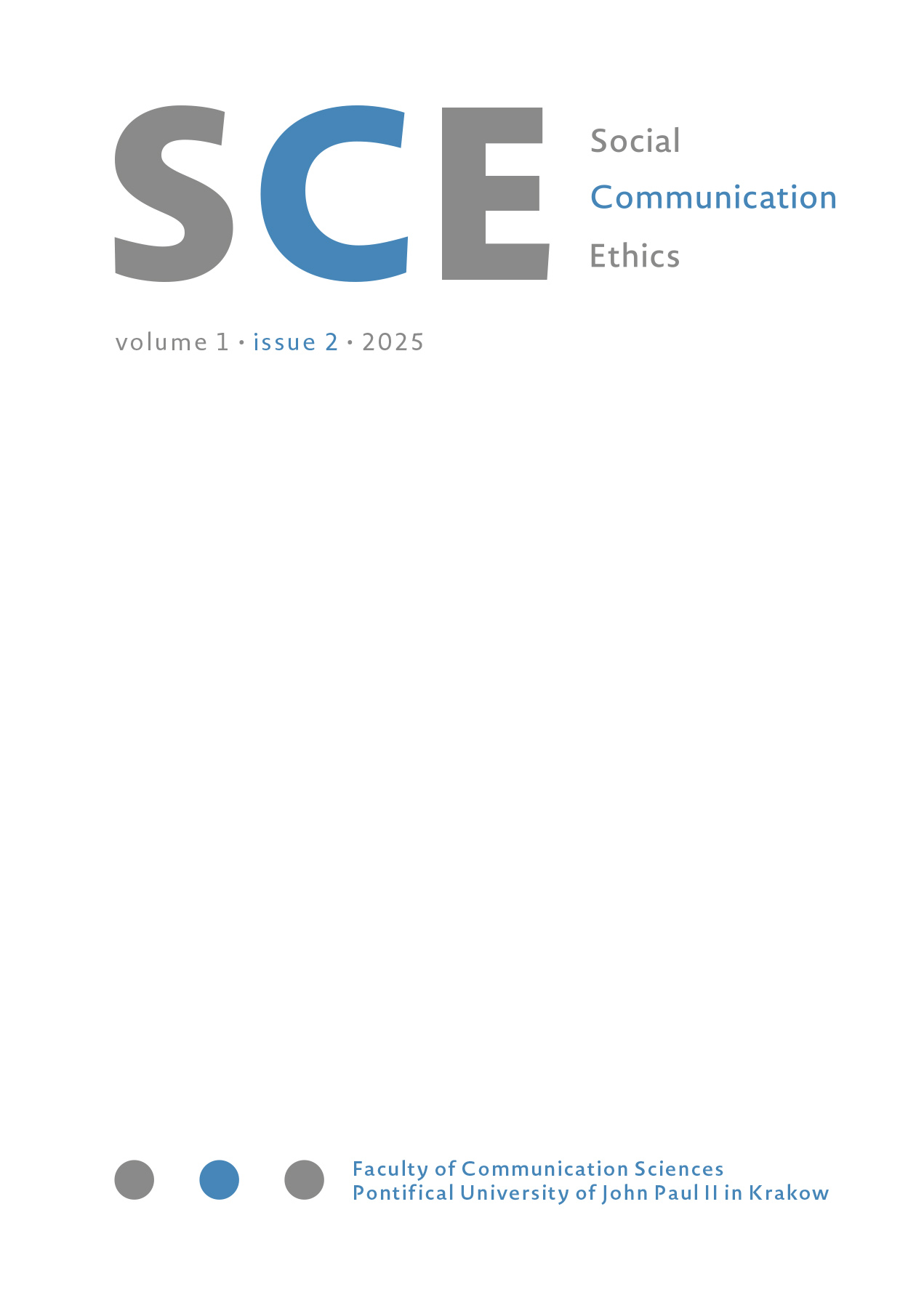The ethics of social communicationin performance ESG reporting: A multi-dimensional approach
DOI:
https://doi.org/10.15633/sce.01201Słowa kluczowe:
ethical communication, ESG reporting, transparency, greenwashing, regulatory frameworksAbstrakt
The ethics of social communication in performance reporting is a crucial element of modern organizational governance, particularly within the Environmental, Social, and Governance (ESG) framework. This paper explores the multifaceted dimensions of ethical communication, addressing the interplay of legal, sociological, technological, and psychological aspects. By examining national and international legal frameworks, such as the EU’s Non-Financial Reporting Directive (NFRD) and the U. S. The Federal Trade Commission (FTC) Green Guides highlights how regulations shape corporate behavior and promote accountability in ESG reporting. A key novelty of this research lies in its exploration of the dynamic relationship between corporate performance and legal frameworks, showcasing how organizational practices influence internal regulations and standards. The study delves into the ethical challenges that organizations face, such as greenwashing, selective disclosures, and the complexities of balancing transparency with competitiveness. It underscores the importance of values such as transparency, fairness, and accountability as the ethical foundation for corporate communication. Through case studies, including the Volkswagen emissions scandal and the Flint water crisis, the paper illustrates the consequences of unethical communication in both the competitive and public sectors, emphasizing the critical need for integrity and robust oversight mechanisms. The dynamic relationship between corporate performance and legal frameworks is examined, showcasing how organizational practices influence international regulations and standards. Feedback loops, such as stakeholder consultations and data-driven reporting, play a pivotal role in refining these frameworks, fostering enhanced accountability, global alignment, and innovation. The conclusion highlights the strategic importance of ethical communication as a driver of trust and long-term success. As organizations navigate increasing regulatory demands and stakeholder scrutiny, adopting proactive strategies that integrate ethical communication, standardized frameworks, and innovative technologies is essential. This paper argues that ethical communication is not merely a compliance obligation but a cornerstone of sustainable development, enabling organizations to align with societal expectations and contribute to a transparent and accountable global economy.
Bibliografia
Burchell, J., & Rettie, R. (2015). Change management for sustainability: An integrated approach to change management and sustainability. Journal of Organizational Change Management, 28(2), 234–246. https://doi.org/10.1108/JOCM-11-2013-0215
Carreno, A. (2024). Strategic integration of ESG in business transformation: A roadmap for sustainable success. SSRN. https://doi.org/10.2139/ssrn.4986686
Domokos, L., & Weltherné Szolnoki, D. (2020). A számvevőszéki teljesítmény mérésének modellje, a teljesítménymenedzsment fő területei. Pénzügyi Szemle Különszám. https://doi.org/10.35551/PSZ_2020_k_1_1
Eccles, R. G., Ioannou, I., & Serafeim, G. (2014). The impact of corporate sustainability on organizational processes and performance. Management Science, 60(11), 2835–2857. https://doi.org/10.1287/mnsc.2014.1984
Eger, T., & Schaefer, H. B. (2018). Reflections on the Volkswagen emissions scandal. SSRN. https://doi.org/10.2139/ssrn.3109538
European Commission. (2014). Directive 2014/95/EU on non-financial reporting. https://eur-lex.europa.eu/eli/dir/2014/95/oj
Fanning, K., Hatfield, R. C., & Sealy, C. L. (2024). Corporate ESG disclosures and regulatory mandates: The role of investors’ perceptions of greenwashing. Behavioral Research in Accounting, 1–19. https://doi.org/10.2308/BRIA-2023-050
Federal Trade Commission (FTC). (2012). Green guides: Guide for the use of environmental marketing claims. https://www.ftc.gov/sites/default/files/attachments/press-releases/ftc-issues-revised-green-guides/greenguides.pdf
Fobbe, L., & Hilletofth, P. (2021). The role of stakeholder interaction in sustainable business models: A systematic literature review. Journal of Cleaner Production, 327, 129510. https://doi.org/10.1016/j.jclepro.2021.129510
Friede, G., Busch, T., & Bassen, A. (2015). ESG and financial performance: aggregated evidence from more than 2000 empirical studies. Journal of Sustainable Finance & Investment, 5(4), 210–233. https://doi.org/10.1080/20430795.2015.1118917
Giese, G., Lee, L.-E., Melas, D., Nagy, Z., & Nishikawa, L. (2019). Foundations of ESG investing: How ESG affects equity valuation, risk, and performance. Journal of Portfolio Management, 45(5), 69–83. https://doi.org/10.3905/jpm.2019.45.5.069
GRI (2021). Global Reporting Initiative Standards: Comprehensive ESG reporting framework. https://www.globalreporting.org/pdf.ashx?id=12334
Hanna-Attisha, M. (2018). What the eyes don’t see: A story of crisis, resistance, and hope in an American city. One world. https://www.penguinrandomhouse.com/books/550935/what-the-eyes-dont-see-by-mona-hanna-attisha
Keilmann, J., & Koch, T. (2023). When environmental claims are empty promises: How greenwashing affects corporate reputation and credibility. Environmental Communication, 18(3), 266–284. https://doi.org/10.1080/17524032.2023.2267782
Layzer, J. A., & Rinfret, S. R. (2019). The environmental case: Translating values into policy. CQ press. https://books.google.at/books?redir_esc=y&hl=de&id=haaEDwAAQBAJ&q=reputational#v=onepage&q=reputational&f=false
Lew, G., Życzyński, N., Olejarz, T., & Pomykała, M. (2024). The importance of CSR and ESG in shaping competitive and image advantage of enterprises. European Research Studies, 27(3), 308–323. https://www.um.edu.mt/library/oar/handle/123456789/127379
Macchiavello, E., & Siri, M. (2022). Sustainable finance and fintech: Can technology contribute to achieving environmental goals? A preliminary assessment of ‘Green fintech’ and ‘Sustainable digital finance’. European Company and Financial Law Review, 19(1), 128–174. https://doi.org/10.1515/ecfr-2022-0005
Noori, R., & Athota, V. S. (2024). Greenwashing in ESG and its implications. In B. Ajithakumari Vijayappan Nair, G. Muschert, & A. Jayachandran (Eds.), ESG frameworks for sustainable business practices (pp. 151–177). IGI Global Scientific Publishing. https://doi.org/10.4018/979-8-3693-3880-3.ch006
Sejal, J. (2024). Greenwashing and the ethics of CSR. International Journal for Multidisciplinary Research, 6(5). https://doi.org/10.36948/ijfmr.2024.v06i05.27029
Siew, M. L., Ahmad, R. A. R., & Zainon, S. (2024). Greenwashing: Analysing the discrepancy between environmental rhetoric and corporate practices. Academic Journal of Business and Social Sciences, 8(1). https://journal.uitm.edu.my/ojs/index.php/AJoBSS/article/view/4411
Vannieuwenhuyse, G. (2023). Exploring the suitability of arbitration for settling ESG and human rights disputes. Journal of International Arbitration, Issue 1, 1–28, https://kluwerlawonline.com/journalarticle/Journal+of+International+Arbitration/40.2/JOIA2023001
Pobrania
Opublikowane
Numer
Dział
Licencja
Prawa autorskie (c) 2025 Adrienn Lajó

Utwór dostępny jest na licencji Creative Commons Uznanie autorstwa 4.0 Międzynarodowe.
Autorzy publikujący w czasopiśmie udzielają jego wydawcy zgody o następującej treści:
- Autor zachowuje autorskie prawa majątkowe do utworu, a jednocześnie udziela wydawcy czasopisma zgody na jego pierwszą publikację w wersji drukowanej i wersji online na licencji Creative Commons Uznanie autorstwa 4.0 Międzynarodowe oraz zgody na wykonywanie opracowań, w tym przekładów.
- Autor ma możliwość udzielania zgody niewyłącznej na opublikowanie utworu w wersji, która ukazała się w czasopiśmie (np. zamieszczenia go w repozytorium instytucjonalnym lub opublikowania w książce), wraz z informacją o jego pierwszej publikacji w czasopiśmie.
- Autor może umieścić swój utwór online (np. w repozytorium instytucjonalnym lub na swojej stronie internetowej) jeszcze przed zgłoszeniem utworu do czasopisma.

